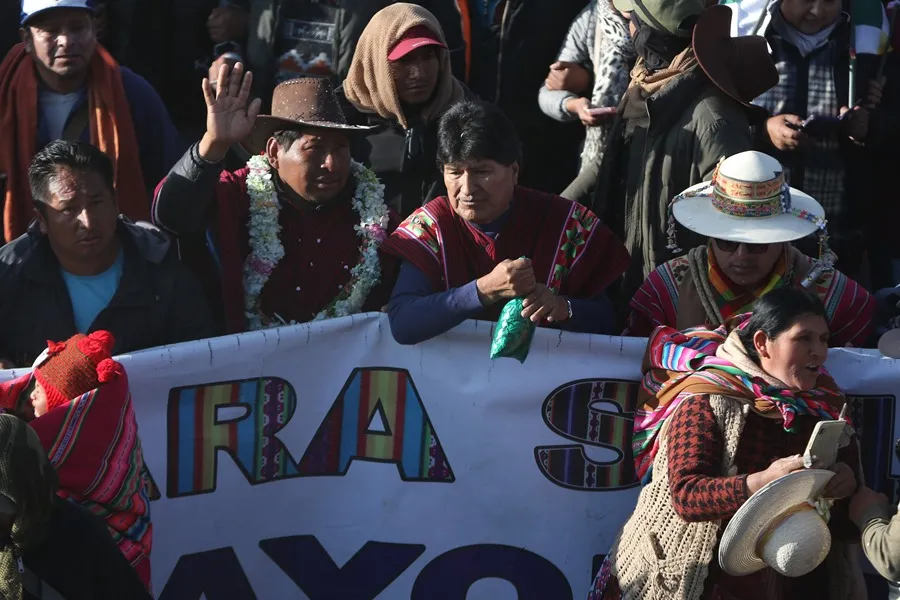International
Thousands of followers of Evo Morales enter La Paz and demand his authorization as a candidate

The march led by the former president of Bolivia and official leader, Evo Morales (2006-2019), arrived this Monday in La Paz, after thousands of his followers joined him in the city of El Alto, to demand that he be qualified as a candidate for the 2025 elections, despite having a constitutional ban.
Morales, followed by miners and indigenous sectors in the front row, entered the city headquarters of the Government through the main highway that connects both cities on his seventh day of a walk that began on September 17 from the town of Caracollo, in the Andean region of Oruro, and that President Luis Arce described as a “coup d’état” against him.
The day before, there were some clashes in El Alto, between Morales’ followers and sectors that defend Arce, which left at least a dozen injured, according to the report of the Ministry of Health.
Freddy Mamani, a pro-government deputy related to Morales, reported that the demonstrators led by the former president will concentrate at the entrance of La Paz, near the highway, where they will read several petitions they have for the Arce Government.
“We are not going to threaten anyone, we are not going to enter Murillo Square, we are going to concentrate here where it will be a party to defend Bolivia,” he said in a statement on Radio Kawsachun Coca, half related to Morales.
President Arce sent several public invitations to Morales to hold a dialogue, however the former president said he did not receive any invitation.
Morales’ followers maintain that it is a march to “save the homeland” in the face of problems such as the shortage of dollars and fuel and the increase in the price of some basic products, and they also demand that the resolutions of a congress of the Movement to Socialism (MAS) held last year – not recognized by the Electoral Court – in which they defined Morales’ candidacy be respected.
The Arce Government considers that the march promoted by Morales is a “coup d’état” that intends to remove him from power so that the head of the Senate, Andrónico Rodríguez, who is related to the former governor, assumes the Presidency of the country.
Morales and Arce have been separated since the end of 2021 due to differences in the State Administration that were deepened in the face of the need to renew the national leadership of the MAS, still in the hands of the former president, something on which the factions loyal to both have not been able to agree.
International
Dominican ‘False Hero’ Arrested for Faking Role in Nightclub Collapse That Killed 231

A man identified as Rafael Rosario Mota falsely claimed to have rescued 12 people from the collapse of the Jet Set nightclub in Santo Domingo—a tragedy that left 231 people dead—but he was never at the scene.
Intelligence agents in the Dominican Republic arrested the 32-year-old man for pretending to be a hero who saved lives during the catastrophic incident, authorities announced.
Rosario Mota had been charging for media interviews in which he falsely claimed to have pulled survivors from the rubble after the nightclub’s roof collapsed in the early hours of April 8, during a concert by merengue singer Rubby Pérez, who was among those killed.
“He was never at the scene of the tragedy,” the police stated. The arrest took place just after he finished another interview on a digital platform, where he repeated his fabricated story in exchange for money as part of a “media tour” filled with manipulated information and invented testimonies.
“False hero!” read a message shared on the police force’s Instagram account alongside a short video of the suspect, in which he apologized: “I did it because I was paid. I ask forgiveness from the public and the authorities.”
Central America
Nicaraguan Exiles to Mark 7th Anniversary of 2018 Protests with Global Commemorations

The Nicaraguan opposition in exile announced on Thursday that it will commemorate the seventh anniversary of the April 2018 protests against the government of President Daniel Ortega and his wife, Rosario Murillo, with events in Costa Rica, the United States, and several European countries.
The commemorative activities—which will call for justice for the victims, as well as freedom and democracy for Nicaragua—will include religious services, public forums, cultural fairs, and other public gatherings, according to official announcements.
In April 2018, thousands of Nicaraguans took to the streets to protest controversial reforms to the social security system. The government’s violent response quickly turned the demonstrations into a broader call for the resignation of President Ortega, who is now 79 and has been in power since 2007.
The protests resulted in at least 355 deaths, according to the Inter-American Commission on Human Rights (IACHR), although Nicaraguan organizations claim the toll is as high as 684. Ortega has acknowledged “more than 300” deaths and maintains the unrest was an attempted coup d’état.
International
Arsenal stun Real Madrid at the Bernabéu to reach Champions League semifinals

Arsenal enjoyed a “historic night” on Wednesday after defeating Real Madrid 2-1 at the Santiago Bernabéu, knocking them out of the Champions League quarterfinals, midfielder Declan Rice said.
“It’s such a special night for this club, a historic night for this club,” said Rice, who scored twice in the first leg in London, speaking to TNT Sports.
The English international was named Man of the Match in both legs — the 3-0 win in London and the second leg in Madrid.
“It’s amazing. I knew we were on an upward trajectory and we’ve done incredibly well in this competition. We deserve it and we have full confidence in our coach. Reaching the semifinals is unbelievable,” Rice added.
-

 International4 days ago
International4 days agoNightclub Collapse in Dominican Republic Claims 226 Lives
-

 International4 days ago
International4 days agoVenezuela accuses Guyana of “warlike intentions” after UK defense deal
-

 Central America3 days ago
Central America3 days agoHonduran Police Offer $135K for Tips Leading to the Arrest of Romeo Vásquez
-

 Central America2 days ago
Central America2 days agoPetro questions Ecuador’s vote, cites reports of military control and arrests
-

 International3 days ago
International3 days agoMPV Denounces Electoral Blockade as Secretary-General is Disqualified for May Elections
-

 International3 days ago
International3 days agoMaduro Plans Major Workers’ March on May 1st to Defend Venezuela’s Freedom
-

 International1 day ago
International1 day agoArsenal stun Real Madrid at the Bernabéu to reach Champions League semifinals
-

 International1 day ago
International1 day agoBogotá residents line up for yellow fever vaccine amid national alert
-

 International1 day ago
International1 day agoMexico refuses to restore ties with Ecuador while Noboa remains in office
-

 International2 days ago
International2 days agoColombia: Search continues for missing limb of italian scientist found dismembered
-

 International1 day ago
International1 day agoDeSantis’ immigration crackdown sparks alarm in Venezuelan Communities in Doral
-

 International2 hours ago
International2 hours agoDominican ‘False Hero’ Arrested for Faking Role in Nightclub Collapse That Killed 231
-

 Central America2 hours ago
Central America2 hours agoNicaraguan Exiles to Mark 7th Anniversary of 2018 Protests with Global Commemorations















